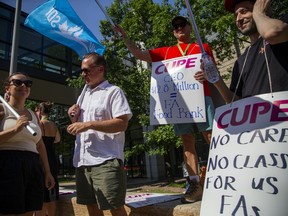Health
Air Canada Delays Return to Service Amid Union Strike Action

Air Canada has announced that it will postpone its return to service until the evening of Monday, following a refusal by the Canadian Union of Public Employees (CUPE) to comply with a back-to-work order issued by the Canadian Industrial Relations Board (CIRB). The airline typically operates around 700 flights daily, but the ongoing dispute has led to the cancellation of approximately 240 flights, stranding numerous passengers across the country.
The CIRB’s directive came after Patty Hadju, Canada’s Minister of Jobs, intervened in the labor dispute. In a statement, Air Canada indicated that it intends to resume flights on Monday evening, while also advising customers to avoid the airport unless they have confirmed flights with other airlines.
In a show of defiance, CUPE, which represents about 10,000 flight attendants, announced its intention to challenge the CIRB’s order to resume work by 14:00 ET on Sunday. Mark Hancock, CUPE’s national president, expressed dissatisfaction with the situation, stating that the union felt the process was unfair and criticized Air Canada for not engaging in meaningful negotiations. “Air Canada has really refused to bargain with us,” Hancock said outside the Toronto airport.
The strike has caused significant disruption, leaving thousands of travelers seeking alternative arrangements. Air Canada has offered affected customers options, including full refunds or credits for future travel. Additionally, the airline is facilitating rebookings on other carriers, although availability is limited due to the peak summer travel season.
Union’s Response and Demonstrations
CUPE’s leadership has publicly condemned the government’s actions, accusing Minister Hadju of siding with Air Canada. The union has called for a “day of action,” organizing demonstrations at major airports in Toronto, Montreal, Vancouver, and Calgary. At a rally in Toronto, Natasha Stea, president of CUPE Local 4091, emphasized the workers’ determination to stand against what they perceive as unfair treatment by the airline and the government. “We are done being abused and exploited,” Stea asserted.
The labor dispute traces back to an expired collective agreement on March 31, 2023. CUPE has highlighted key issues, including wages that have not kept pace with inflation over the past decade and the failure to compensate for unpaid labor when aircraft are not in service.
As the situation continues to unfold, both Air Canada and CUPE have indicated a willingness to negotiate. CUPE has extended an invitation to Air Canada to return to the bargaining table in hopes of reaching a fair resolution.
The airline’s management has previously requested that Minister Hadju mandate binding arbitration to resolve the conflict, a power granted under Section 107 of the Canada Labour Code. As the strike persists, the impact on air travel and passengers remains significant, with many still navigating the uncertainty of their travel plans.
With the situation evolving, Air Canada and CUPE’s negotiations will be closely watched as they seek a resolution that addresses the concerns of flight attendants while restoring normal operations for travelers.
-

 Education4 months ago
Education4 months agoBrandon University’s Failed $5 Million Project Sparks Oversight Review
-

 Science5 months ago
Science5 months agoMicrosoft Confirms U.S. Law Overrules Canadian Data Sovereignty
-

 Lifestyle4 months ago
Lifestyle4 months agoWinnipeg Celebrates Culinary Creativity During Le Burger Week 2025
-

 Health5 months ago
Health5 months agoMontreal’s Groupe Marcelle Leads Canadian Cosmetic Industry Growth
-

 Science5 months ago
Science5 months agoTech Innovator Amandipp Singh Transforms Hiring for Disabled
-

 Technology5 months ago
Technology5 months agoDragon Ball: Sparking! Zero Launching on Switch and Switch 2 This November
-

 Education5 months ago
Education5 months agoNew SĆIȺNEW̱ SṮEȽIṮḴEȽ Elementary Opens in Langford for 2025/2026 Year
-

 Education5 months ago
Education5 months agoRed River College Launches New Programs to Address Industry Needs
-

 Business4 months ago
Business4 months agoRocket Lab Reports Strong Q2 2025 Revenue Growth and Future Plans
-

 Technology5 months ago
Technology5 months agoGoogle Pixel 10 Pro Fold Specs Unveiled Ahead of Launch
-

 Top Stories4 weeks ago
Top Stories4 weeks agoCanadiens Eye Elias Pettersson: What It Would Cost to Acquire Him
-

 Technology3 months ago
Technology3 months agoDiscord Faces Serious Security Breach Affecting Millions
-

 Education5 months ago
Education5 months agoAlberta Teachers’ Strike: Potential Impacts on Students and Families
-

 Business1 month ago
Business1 month agoEngineAI Unveils T800 Humanoid Robot, Setting New Industry Standards
-

 Business5 months ago
Business5 months agoBNA Brewing to Open New Bowling Alley in Downtown Penticton
-

 Science5 months ago
Science5 months agoChina’s Wukong Spacesuit Sets New Standard for AI in Space
-

 Lifestyle3 months ago
Lifestyle3 months agoCanadian Author Secures Funding to Write Book Without Financial Strain
-

 Business5 months ago
Business5 months agoNew Estimates Reveal ChatGPT-5 Energy Use Could Soar
-

 Business5 months ago
Business5 months agoDawson City Residents Rally Around Buy Canadian Movement
-

 Business3 months ago
Business3 months agoHydro-Québec Espionage Trial Exposes Internal Oversight Failures
-

 Technology5 months ago
Technology5 months agoFuture Entertainment Launches DDoD with Gameplay Trailer Showcase
-

 Top Stories4 months ago
Top Stories4 months agoBlue Jays Shift José Berríos to Bullpen Ahead of Playoffs
-

 Technology5 months ago
Technology5 months agoWorld of Warcraft Players Buzz Over 19-Quest Bee Challenge
-

 Top Stories3 months ago
Top Stories3 months agoPatrik Laine Struggles to Make Impact for Canadiens Early Season










